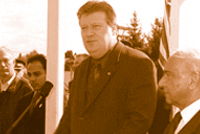Though its proponents claim that Canada’s national sex offender registry will track dangerous offenders, Xtra West has learned that a loophole could result in people charged for having sex in bathhouses or parks being labelled a sex offender for the rest of their lives.
The federal department at work on creating the registry isn’t sure who will end up on its list.
“I can’t say for a fact that some sex offences don’t apply,” says Simone MacAndrew, a spokesperson for Public Safety and Emergency Preparedness Canada. But, she says, the registry isn’t intended to single out gay sex.
“The issue of gay men having sex in a park isn’t the information the police are interested in. It won’t help solve these cases.”
The national registry — also known as Bill C-16 — was created Dec 15, 2004 to assist local police services investigating crimes of a sexual nature by providing a list of known sex offenders in the area. The bill is a response to police concerns over the statistically high likelihood of dangerous sex offenders re-offending. Statistics also suggest that the majority of sex offenders commit their crimes within a two-kilometre radius of where they
live or work.
The gay community has historically opposed labelling people convicted of victimless illegal sexual activity — like park sex, sex involving more than two people, bathhouse sex and anal sex in some situations — as dangerous sex offenders. And civil libertarians have agreed, and additionally insisted that those arrested but not convicted be added to a registry.
The RCMP appears confused about who will be included in the registry. “It’s not child specific, the registry. It’s not even gender specific,” says Monique Beauchamp, a national spokesperson for the RCMP. “We’ll enforce the
law, but the law as to how it was made, that’s [up to] the government. It’s based on the Criminal Code, which already exists.
“Whether the one specific example [public sex] you’re giving me would get someone on the list, I don’t know,” says Beauchamp.
The government’s Sex Offender Information Registration Act (SOIRA) is specific in naming what sex offences of the Criminal Code are included. The RCMP sum it up nicely on their website as: sexual interference, invitation to sexual touching, sexual exploitation, incest, bestiality, child
pornography (making, possessing, distributing), parent or guardian procuring sexual activity, exposure, and sexual assault (including with weapon, aggravated, threats to third party or causing bodily harm).
But the actual sex offender registry has a much lengthier list including kidnapping, abducting, gross indecency, owning a theatre that is hosting an immoral theatrical performance, and indecent acts among others. Gross indecency is a charge often applied to the gay community for consensual victimless “crimes.” The list leaves out anal sex.
“The act states specifically which offences apply, but there’s provisions for the province to say in specific situations there are enough offences that it does apply,” says MacAndrew.
This is the loophole that concerns gay activists. Every sex-related offence has the potential to be included in the registry at the initiative of a province.
The registry is a good step towards protecting British Columbians, and children, says BC Solicitor General Rich Coleman. “Every tool that helps police solve sex crimes should be made available.”
Cops will have tremendous leeway in choosing how to use the registry, says Shawn Dearn, another spokesperson for Emergency Preparedness Canada.
“The SOIRA is designed to protect individuals, children primarily. As to how this tool will be used, it will be up to individual police forces in your area,” he says.
When asked if it will be possible for the registry to be used to target gay men having sex in a park, MacAndrew says that the way the act “was built and organized was done with huge efforts to meet the requirements of the Charter
of Rights and Freedoms.”
“I can’t provide an opinion,” she adds. “I work for a government department.”
The act allows provincial police to collect data from convicted sex offenders for a national database. This information includes up-to-date addresses, telephone numbers, the offence, and may include alias(es), a
photograph, identifying marks or tattoos. It also requires offenders to re-register annually or if they change addresses.
The provinces are responsible for maintaining and operating the database, and every person must be added to the registry at the request of the province. But only RCMP and police services investigating crimes of a sexual
nature will have access to the registry.
People will be listed on the registry for 10 years, 20 years, or for life depending on the nature of the crime and sentencing. Current proposals will see people sentenced to at least two years added to the registry. Only those
now incarcerated or on parole, and future offenders will be listed. Approximately 1000 convicted sex offenders are serving sentences in BC today, and an average of 500 are convicted in this province yearly.
Coleman is taking a hard-line position. “We’ll continue to push Ottawa to get even tougher by making the registry retroactive, to include all known sex offenders,” he says.
BC has faced this issue before.
In 2001, the NDP government under former BC Premier Ujjal Dosanjh proposed a provincial sex offender registry. The bill initially included non-aggravated sex crimes such as consensual public sex and anal sex, but was changed after Xtra West asked Dosanjh questions about classifying victimless sex acts in the same category as dangerous sex offences.
At the time, Dosanjh agreed that the bill needed amending on third reading. In the end, the incoming Liberal government chose not to proclaim the bill, waiting instead for a national registry.
Bill C-16 was introduced in December 2002, but didn’t receive Royal assent until Apr 1, 2004.

 Why you can trust Xtra
Why you can trust Xtra


